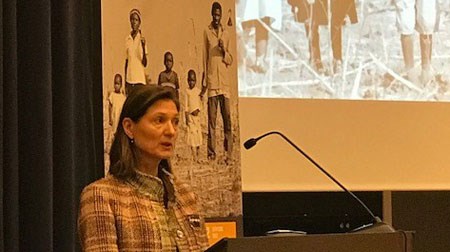Åpningsinnlegg ved #nullsult-konferansen
Historisk arkiv
Publisert under: Regjeringen Solberg
Utgiver: Utenriksdepartementet
Tale/innlegg | Dato: 17.11.2017
Av: Tidligere statssekretær Marianne Hagen (Oslo, 17. november 2017)
Statssekretær Marianne Hagens åpningsinnlegg ved #nullsult-konferansen til Caritas og NHO, 17. november 2017.
Check against delivery
Ladies and Gentlemen,
Thank you for inviting me to open this important conference on SDG 2, the global goal to end hunger.
The world has made tremendous progress in reducing poverty since year 2000. The number of people suffering from hunger and malnutrition has been reduced at high rates. So, there is optimism to end hunger and improve nutrition by the year 2030.

However, more efforts are needed to reach this goal. The latest reports from the United Nations show that the number of undernourished people in the world has increased recently. It is estimated that 815 million people suffered from undernutrition in 2016, an increase of tens of millions in one year. So, there is reason to worry that hunger might be on the rise again.
The world’s farmers produce enough food to meet the needs of an expanding global population. Yet, 20 million people are on the brink of starvation. Sub-Saharan Africa with its high population growth and vulnerability to climate change face the greatest challenges. The continent already bears a substantial burden as it imports food worth 40 to 50 billion US dollars every year.
The African Development Bank estimates that transforming Africa’s agriculture to end food imports within a decade would require a total investment of 30 to 40 billion US dollars a year for the next 10 years. Considerable private sector investment and technology transfer would be needed to succeed.
The Norwegian policy framework reflects these needs. Our 2015 white paper on private sector development in Norwegian development cooperation is one example. Also, this year’s white paper on our common responsibility to reach the SDGs, called on strategic partnerships between civil society, private sector, research institutes and the authorities.
One example of a successful partnership addressing challenges in the fish feed value chain is the Norwegian company Skretting’s participation in aquaculture production in Lake Kariba in Southern Africa. It is important to source inputs through local value chains to ensure that the fish feed produced is also available to smaller fish farmers. There are similar partnership arrangements in Tanzania and Malawi, and others will be established next year in Mozambique, Ethiopia, Ghana and Zambia.
Another example is The Royal Norwegian Society for Development’s key role in the export of cashew nuts from Mozambique to Brynhild Gruppen, a company supplying the national supermarkets with quality snacks. Through this partnership, African smallholders gain access to a foreign market as suppliers, and they are also shareholders in the processing and sales company.
We need more innovative solutions to increase food production in Africa. The Farm to Market Alliance was formed to give farmers access to predictable markets through non-traditional partnerships. This ensures stable prices for the farmers. Members of the alliance include The World Food Program and Yara.
The Government will continue to focus on partnerships that address the needs of farmers while reducing the risk for private investors in new markets. Norad recently issued a call for proposals inviting companies and NGOs to join forces to address specific bottlenecks in value chains in developing countries. Several proposals from the agriculture and aquaculture sectors were selected for implementation from early next year.
The Government hopes to see more innovative public-private partnerships in the future. We are reviewing different options for supporting such programmes, while drawing on relevant experience from Norfund.
To achieve the second SDG, we have to think creatively and rally our efforts.
I wish you productive discussions on the important topic of ending hunger.